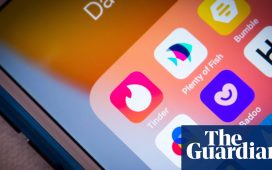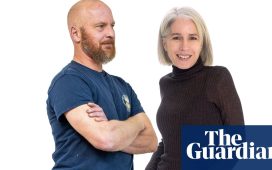[ad_1]
Like all great love stories, this one begins with sweat-patches. It was July 2018, and London was in the grip of the kind of heatwave that melts tarmac. At 7.21pm, Emily Lewis stumbled off the train in a state of panic. She was meant to be attending a Guardian Blind date in exactly nine minutes, but her T-shirt was soaked with sweat.
Spotting a Gap store across the road, Emily dashed in and bought a new top almost at random, hiding her wet shirt at the bottom of her rucksack. With three minutes to go, she power-walked to the restaurant, but at the door she faced another hurdle – the hostess had never heard of the Guardian, let alone Blind date. Sweating through her new top, and almost ready to give up, Emily felt a tap on her shoulder. A woman with dark hair was smiling at her, looking cool and unruffled. “I’m Sophie,” she said. “And I think you’re my date.”
The rest of the evening ran more smoothly. Once Emily was actually sitting down, with the full force of the restaurant air conditioning washing over her, she began to have that very specific good first-date feeling – the kind you experience perhaps once or twice in a lifetime. Sophie Swain was beautiful, and curious, and talking to her felt almost preternaturally easy. Sophie, for her part, thought that Emily looked remarkably composed, for a woman who had just sprinted through central London in 34C heat. Emily made her laugh, and she had an amazing quiff.
Just before midnight, they walked to the station together, slightly tipsy. At the bottom of the escalators, Sophie leaned in, and they shared a very public goodbye kiss, in full view of roughly 100 passengers who were rushing to catch the last train. A passing child shouted out to his parents: “They’re kissing because they don’t want to leave each other!”
As it turns out, that boy was right. In late June this year, Sophie and Emily wrote to the Guardian to tell us they were planning a civil partnership – organised to coincide with the sixth anniversary of that first kiss. I call the couple up a few weeks after the ceremony, to get the full story of their romance. They speak to me on Zoom, from their flat in south London – and just visible on the bookshelf behind them is a congratulations card, decorated with a print-out of the original “Sophie and Emily” Blind date column.
One question – “Marks out of 10?” – hadn’t made it on to the card, so I begin by asking about the most brutal part of the Blind date experience: the scoring system. While Sophie gave Emily a nine out of 10, Emily only scored Sophie eight. Was there bad blood? Emily puts her head in her hands and groans. “I wanted to give her a nine! I was trying to play it cool!”
Emily and Sophie both applied to go on a Guardian Blind date on a whim. At the time, their only experience of dating strangers was via Tinder, where all you have to do to set up a profile is upload five pictures and start swiping – so actually typing out a paragraph listing specific hobbies and passions, and emailing it off, felt oddly revealing. Emily applied after four glasses of wine, and remembers listing interests such as drumming, yoga, and being outside. “The most anyone writes on Tinder is that they are DTF (AKA up for casual sex), so writing that felt a bit earnest – but it was worth it, because I got to meet Sophie.”
For the last two years, I have been the Guardian’s resident Cupid. Every week, I send a couple out on a blind date, but I can take no credit for Sophie and Emily’s success story. They were set up by my predecessor, Nina Trickey, whose superb matching skills have resulted in five Blind date weddings so far, plus at least two Blind date babies. Nina remembers connecting the couple because they both seemed outdoorsy and adventurous (so that earnest paragraph about hobbies was not written in vain) – but also admits that there was an element of luck.
“I used to keep a massive spreadsheet listing all the applicants’ names and contact details, plus their availability,” she explains. “I suspected they would hit it off, but they were also, crucially, free in the same week.”
Jill Mead, a Guardian photographer who often shoots the couples, also picked up on some potential chemistry ahead of their date, when they each came to the Guardian office to have their photo taken. Nina had already arranged for Sophie and Emily to go out that week, but once Jill met and photographed each of them she was sure that Sophie and Emily were going to get along.
The day after the date, Nina received Emily and Sophie’s answers to the questionnaire and read them out loud in the office to the magazine team. When she got to the “Did you kiss?” question, everyone cheered. The team always get a boost from a successful date.
By the time we published Sophie and Emily’s column (read it here), the couple were already planning their third date. They were inseparable for most of that summer. Emily tells me she barely ever went home: she was working very long hours at a job in London Bridge, and then spending all her nights with Sophie. In those first few months, Sophie would sometimes leave handwritten notes out for Emily to find before she left the house for the office at the crack of dawn. Propped up on the kitchen table there would be a message for her such as: “Everything will be OK today.” Emily had never experienced that level of care in a relationship, and it was a revelation.
“I’m very straight and linear in my thinking. Sophie is the absolute opposite of that,” Emily says. “She’s so warm, but it also translates to the way she looks at the world. She’s very focused on people and feelings, whereas I tend to focus on facts. When somebody reacts to something in a very different way to you, it’s always surprising. That keeps things interesting between us.”
Most first dates are characterised by subterfuge, and game-playing, but taking part in the Guardian column requires daters to make themselves vulnerable. Even if they apply on the spur of the moment, as Emily and Sophie did, people are making a very public attempt at love – or, at the very least, lust. For Sophie, the brazenness of appearing in a national newspaper was part of the appeal.
after newsletter promotion
“I’d been out as a lesbian since school, but I was feeling especially confident that summer, and I wanted to be visible,” she says. At the time when Sophie applied, there weren’t that many queer women on the Blind date pages, and she wanted to redress the balance. A few months after the “Sophie and Emily” column hit newsstands, the Guardian ran an infamous Blind date, where two women crashed a house party together – and one of them left her knickers behind.
“I’m not saying we inspired the ‘knicker date’, but I do like to think we paved the way,” Sophie says. “Perhaps we should have invited them to our civil partnership?”
When Emily applied to do the column she had only been out as bisexual for two years. “I signed up because I was ready to be more public about my sexuality,” she explains. “But I definitely wasn’t in the same place as Sophie.” Emily credits the relationship with making her less guarded. “I didn’t grow up talking about my emotions, so I still struggle with that.” At first, when Sophie would tell Emily that she loved her, or say she was beautiful, Emily found it difficult to hear. “I would say I love you every now and again, but Sophie said it all the time, and I suppose I found it difficult to accept.” Over the course of the relationship, she has become more demonstrative. “It’s not like I was a cold, hard rock when we met, but Sophie has definitely changed me.” The morning after their first night together, Emily woke up so thrilled, she decided to buy everyone in her office brownies. “My team was in shock. For the past three years I had been coming into work every day so morose!”
Sophie and Emily never officially proposed to one another, but they discussed the idea of marriage, a year or two into their relationship. Emily was initially resistant, because she felt squeamish about the vows (“I hate the idea of standing up in front of loads of people and expressing my feelings”) – and neither of them was interested in the trappings of a traditional wedding. They decided on a civil partnership instead, and the distinction is important to both of them. When the Civil Partnership Act was introduced in the UK, in 2005, it was seen by some as a form of discrimination against queer people, because legally, you can’t have a religious ceremony at a civil partnership, and you aren’t allowed to say vows. Campaigners had to wait a few more years, until the Marriage Act came into force in 2014, before they could have a “real wedding”. But civil partnerships have since been embraced by couples precisely because they are not weddings. “I wasn’t keen on any structure of ownership, but I wanted to have our love recognised in the eyes of the law,” Sophie explains. “That wasn’t an option for two queer people 20 years ago, so it felt important to me.”
The civil partnership took place in July this year, at Southwark Register Office. Sophie and Emily kept the service deliberately short and sweet, and only invited family and close friends. “There were no vows, but I did manage to stare deeply into Sophie’s eyes and hold hands in front of our respective families – so I’ve come a long way!” says Emily. The register office backs on to a small, leafy park. Afterwards, the couple were joined by more friends, who had laid out picnic blankets, and brought bottles of champagne. In the evening, they walked to a Kurdish restaurant around the corner, and had a celebratory dinner. Arranged in pride of place in the middle of the table was a framed print-out of their original Blind date page. After a lot more alcohol had been consumed, two friends surprised Sophie and Emily by doing a dramatic reading of the column. “It was fun, but embarrassing,” Emily says. “I got so much grief for only scoring Sophie an eight.”
Sophie and Emily tell me that one lovely thing about having met through the column is that friends – and even vague acquaintances – feel invested in their relationship. “I got texts from people I hadn’t seen since school when the article came out,” Sophie says. “For people who read the Guardian, the Blind date column is a Saturday morning ritual, so even strangers are rooting for you. I really enjoy seeing people’s reactions when we explain our origin story.” They still read the column every weekend, and wonder whether their favourite couples ever made it to a second, or third date. “Obviously, we’re most interested in the queer women,” Sophie explains. “Queer people are always more likely to hook up. We know how to get things done.”
Fancy a Blind date? Email blind.date@theguardian.com
[ad_2]
READ SOURCE














